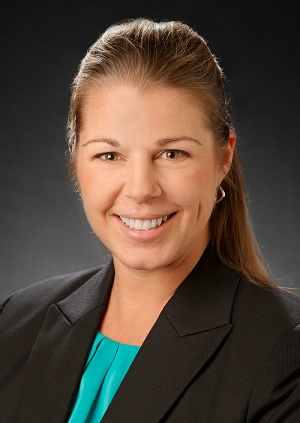
Name Allison Brown
- Education Ph. D. in Microbiology and Immunology, M.P.H. in Epidemiology, B.A. in Biology
- Target Audience Middle School

After a chance introduction to the field of public health, Allison Brown caught the bug! She passed up medical school to become an epidemiologist and now travels the world to solve some of the world's biggest public health problems. Read on to see why Allison's interests are contagious!
I am an infectious disease epidemiologist who works on food-borne infections in people. Epidemiologists, in general, work on a variety of infections that are caused by food, water, or the air we breathe. When people get sick we are like detectives who investigate all aspects of the situation including who is getting sick, what they are sick with and the source of the illness. We also try to determine how these infectious diseases are transmitted, what the source of transmission is, how to stop the transmission and how to prevent further transmission in the future.
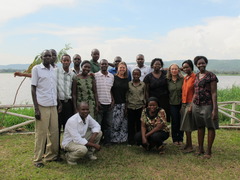
My days are always different. Some days the team of epidemiologists that I work with may feverishly work at trying to solve an outbreak as we gather new numbers and coordinate with different people. On other days we may speak with epidemiologists in state health departments, the Food and Drug Agency (FDA) and the US Department of Agriculture (USDA) about food products, the Environmental Protection Agency (EPA) about water or soil samples, and scientists who may be conducting the local investigation. Some days we may find ourselves taking samples of food or the environment; or we may be collecting samples at a hospital. My job also entails a lot of computer work with numbers and data to track trends in infections to see if these trends are related to weather patterns or major events. For instance, if a major event like the World Series is coming up in an area that is experiencing an outbreak, we may urgently try to solve the outbreak before large numbers of people arrive to prevent them from getting sick and spreading the disease all over the country when they go back home I also write a lot of memos and papers, and I even write explanations and details about investigations and outbreaks that are placed in letters and reports to our United States Congress.
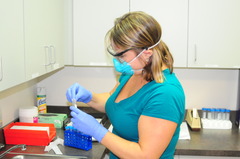 Epidemiology is all about collecting as much data as possible and knowing which data is needed and how it will be collected. We compare data on sick people to data on people who aren't sick to try to narrow down the specific factors that are causing illness. When people are getting sick we conduct long interviews with people who are ill and ask them about their symptoms, what they did in the days leading up to their symptoms and what they commonly do. We then ask these same questions of people who are not ill, then plug all this information into a database to compare them.
Epidemiology is all about collecting as much data as possible and knowing which data is needed and how it will be collected. We compare data on sick people to data on people who aren't sick to try to narrow down the specific factors that are causing illness. When people are getting sick we conduct long interviews with people who are ill and ask them about their symptoms, what they did in the days leading up to their symptoms and what they commonly do. We then ask these same questions of people who are not ill, then plug all this information into a database to compare them.
I like that my job is important and there are a ton of opportunities for people with many different skills. We work in big teams at the Center for Disease Control (CDC), and all of us have different areas that we're very good at. Some people are good at math and statistics, some are better at outreach and interviewing, some are good at getting data together and writing it up, some are good at figuring out how science translates into policy and then we have behavioral scientists who look at how and why people act in a certain way. It is a great opportunity to see many people with many talents and backgrounds come together for one important purpose.
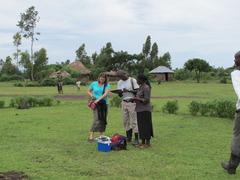
When I was growing up I liked everything. I loved science, math, English, theater, you name it. My brother used to tell me that someday I would have to choose one of these subjects and pursue it, but I didn't believe him, and I still don't. I still love to read and write, and I use these skills a lot in my job. My favorite subjects, however, were always science and math. Math was great because there were always answers and science was great because it explores the world around you. I thought gross things like parasites were so cool and I loved to dissect things. I always took both science and humanities classes, because I think it is important to keep a well-rounded brain.
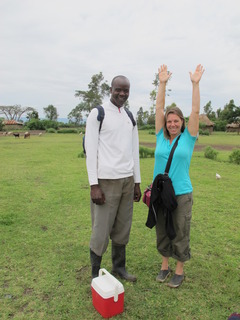
When I was growing up, I never knew that this field existed. I thought you could be a doctor, a lawyer or businessperson and that's it. It was difficult for me in elementary and high school to love to read and write and to love science and math, because I was told I had to choose one or the other. When I got to college people told me that if I wanted to pursue health I had to go to medical school. I knew that medical school was not for me and I had to trust that I would find something that was right. I think it's difficult for a lot of people to trust in what they love enough to pursue whatever that is, whether they have a clear idea of their career path or not. I found out relatively quickly after college which career path I wanted to take, and each decision I made got me closer and closer to the job I have now that I love. It's difficult to trust your gut.
The field of public health is much bigger than it was when I was younger and I wouldn't be surprised if there are classes that you can take before college. If you ever hear of an activity or opportunity that mentions public health, try to participate and get involved. Pay attention in all science classes, but also don't forget to improve your reading and writing skills as well. Also, watch what is going on in the news. Epidemiologists have exciting jobs and get to travel a lot when they are called on for disease outbreaks, so it's nice to stay updated on what is going on in the world.
The CDC has also put out a free iPad app called Solve the Outbreak. Students can use this app to try their hand at solving an outbreak by figuring out how they started before they can spread. Check it out here.
Math is definitely something to focus on. Math teaches you a good way of thinking, and once you get to college a lot of the science degrees require math courses. Also, take a variety of science courses, because each type of class gives you a different way to look at problems and problem solving. English and writing should not be left out, because learning how to write is extremely important. Political science classes are also important, especially if you work for the government, and international studies classes are good to help you gain a more global perspective. Most importantly, follow whatever interests you have and you will find the right place.
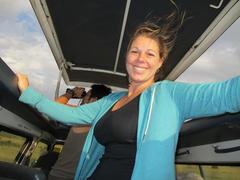 This is a growing field that can use many different people with many different skill sets. There are a lot of different outreach and communication opportunities that are available now that weren't available 10 years ago. This field also holds steady during bad economic times. There is always a need to improve health and respond to health emergencies. One of the most interesting things about my job is that it is always evolving. There are always new pathogens being discovered, changes in behavior that make things more risky, and new forms of old pathogens are always popping up.
This is a growing field that can use many different people with many different skill sets. There are a lot of different outreach and communication opportunities that are available now that weren't available 10 years ago. This field also holds steady during bad economic times. There is always a need to improve health and respond to health emergencies. One of the most interesting things about my job is that it is always evolving. There are always new pathogens being discovered, changes in behavior that make things more risky, and new forms of old pathogens are always popping up.
Some of the more exciting things happening in my field are the vaccination efforts. Small pox was the first and only disease to be completely eradicated due to vaccinations, and now we are working to eradicate polio completely. There are also global scourges, such as malaria, that people are always trying to get a handle on. Because this is a rapidly growing field we are gaining a constantly evolving group of people who help bring new perspectives and new ideas to these problems.
Ebola: A highly lethal virus that causes massive internal hemorrhaging. It is thought that the virus originated in central Africa and was passed to humans from primates.
Epidemiology: the branch of medicine dealing with the incidence and prevalence of disease in large populations and with detection of the source and cause of epidemics of infectious disease.
Infectious Disease: A disease resulting from the presence and activity of a pathogenic microbial agent.
Microbial: Having to do with a microorganism, especially a pathogenic bacterium, virus, or parasite.
Abdul Yassine is a senior biology major and soccer player at Southern M…
Melissa Wallace is an SMU alumna who studied Mechanical Engineering. Sh…
Do you love music and science? Do you think you have to choose just one…